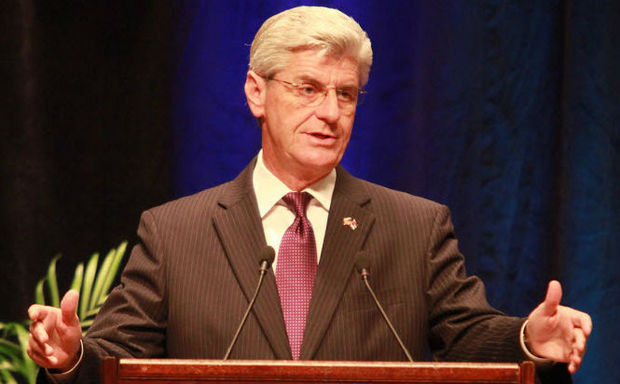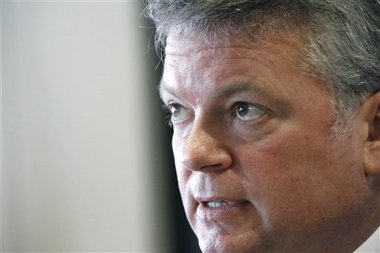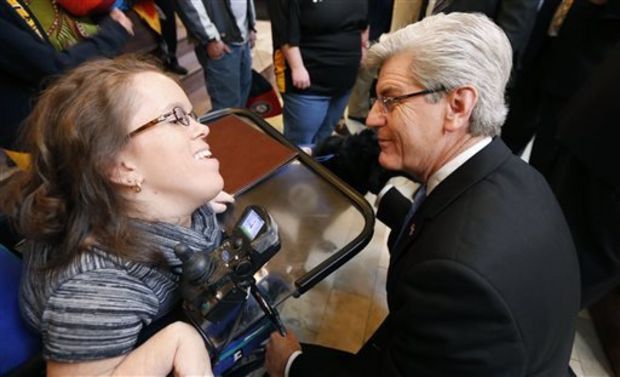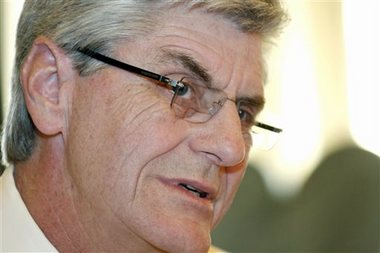

JACKSON, Mississippi (AP) — Gov, Phil Bryant and others are extolling Mississippi as a national leader in using carbon dioxide to extract more oil from old oil fields.
A conference hosted Thursday in Jackson by Rice University and Mississippi State University discussed expanding what’s called enhanced oil recovery. Proponents say it could be a way to increase oil production while at the same time storing carbon dioxide underground, mitigating global warming.
A majority of Mississippi oil production today comes from using carbon dioxide in older fields, driven by an underground carbon dioxide source called the Jackson Dome, which is piped to fields.
“It is amazing the success we are having with enhanced oil recovery in Mississippi,” Bryant said. “Our goal must be energy independence.”
Visitors from states including Michigan said they’d like to push up oil production using carbon dioxide, but don’t have available supplies like the Jackson Dome. But academics and industry officials hope they can increasingly use man-made carbon dioxide from sources such as power plants. Mississippi Power Co.’s Kemper County plant is meant to extract carbon dioxide and sell it to oil companies.
“We’ve got to take it out of the smokestacks and the processes where it’s produced,” said Charles McConnell, executive director of Rice’s Energy and Environment Initiative. “We’re not in a situation where we can look at this as a waste product.”
McConnell said that up to 40 percent of all American oil production could come from enhanced oil recovery. He argued that with increasing energy consumption in Asia, it’s necessary for the United States to seek any method to increase oil production.
“It unlocks reserves that couldn’t otherwise be realized,” McConnell said.
Jostein Mykletun, a Norwegian diplomat based in Houston, said he was following up on a visit last year by the Norwegian minister of petroleum to a Mississippi power plant. Norway has been developing methods to capture and store carbon dioxide, but has struggled.
“We haven’t been able to bring it up to scale,” Mykletun said.
He told attendees he’d talked to Bryant and hopes to build a partnership with Mississippi universities to study issues around carbon capture.
Mississippi doesn’t tax carbon dioxide pulled out the ground and has cut severance tax rates on oil production. But lawmakers have debated anew this year how the state should regulate and tax carbon dioxide. Some lawmakers wanted to force Denbury Resources Inc. to open its private pipeline to others who wanted to ship the gas, and to tax carbon dioxide that the Plano, Texas-based company is shipping out of state. Proponents of those moves argue that there are many small oil fields that could be brought back into production if more of the gas stays in Mississippi.
Denbury has fought off those moves, supported by many in the state’s existing oil industry.
“They were looking at the issue with a lack of understanding about the capital-intensive nature of the business and the sometimes razor-thin margins,” Patrick Sullivan of the Mississippi Energy Institute said of proposed legislation.
Keith Bowman, who works for Tellus Operating Group, another Mississippi producer, said cutting costs is key to developing smaller fields in Mississippi
“We need to develop the technology on a smaller footprint, which will require some kind of mobile and modular infrastructure that can be moved around,” he said.



